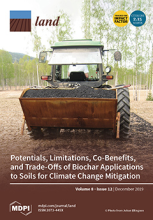Land Library Search
Through our robust search engine, you can search for any item of the over 73,000 highly curated resources in the Land Library.
If you would like to find an overview of what is possible, feel free to peruse the Search Guide.
/ library resources
Showing items 1 through 9 of 23.The importance of agri-food systems for global sustainability calls for researching and advancing socio-technical transitions towards environmentally friendly models of farming.
Building inclusive societies that reflect the needs of all categories of people within the social spectrum is critical to achieving sustainable development.
Most literature on land tenure in sub-Saharan Africa has presented women as a homogenous group. This study uses evidence from Ghana, Nigeria, and Zimbabwe to show that women have differentiated problems, needs, and statuses in their quest for land access and tenure security.
Mainland Southeast Asia (MSA) has seen sweeping upland land use changes in the past decades, with transition from primarily subsistence shifting cultivation to annual commodity cropping. This transition holds implications for local upland communities and ecosystems.
This note is part of an Action Notes series and provides guidance for governments and companies on how to ensure that the impact of agricultural investments on water resources is effectively measured, monitored, and regulated.
This note is part of an Action Notes series and provides guidance for governments and companies on the overall approach to consulting, engaging, and partnering with local communities, to bridge gaps in information and expectation between communities and companies and create the social license to
/*-->*/
This note is part of an Action Notes series and provides guidance for governments and companies on how they can provide effective remedies to affected parties who perceive that their rights have been adversely affected by invesments.
This note is part of an Action Notes series and provides guidance for governments and companies on practices to reduce gender inequalities and to empower women to make a positive contribution to development through agricultural investments.









